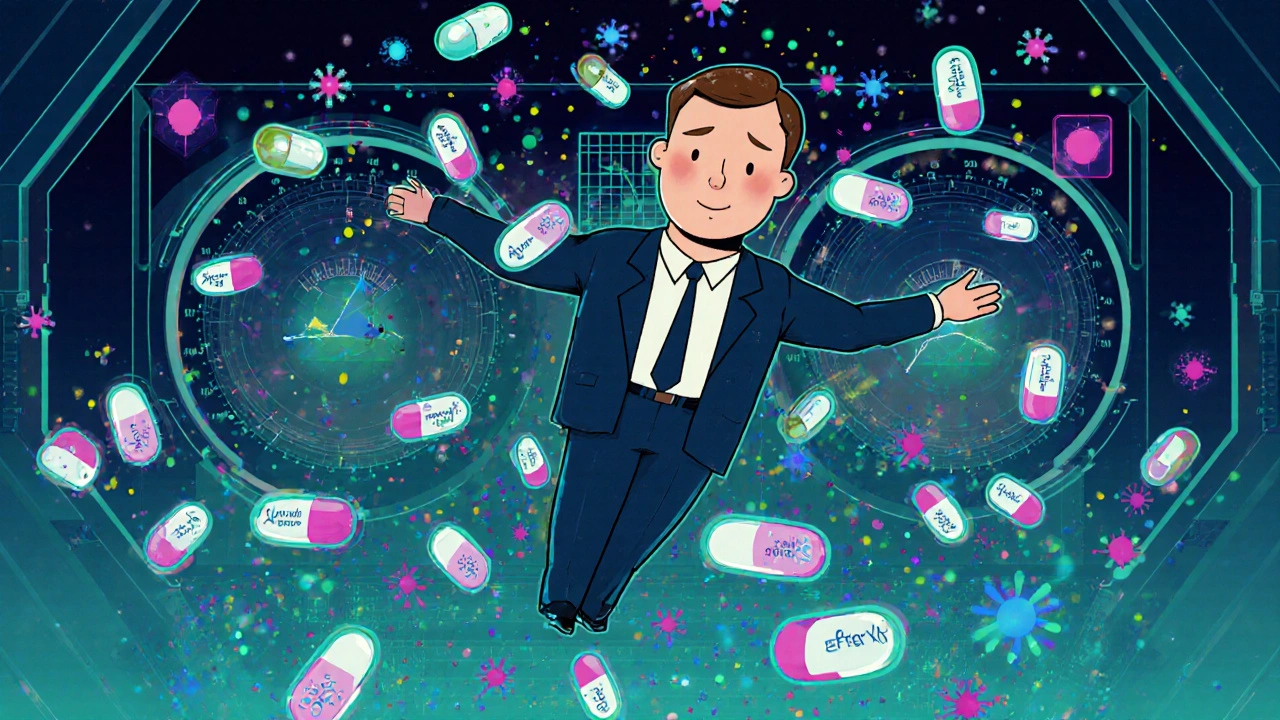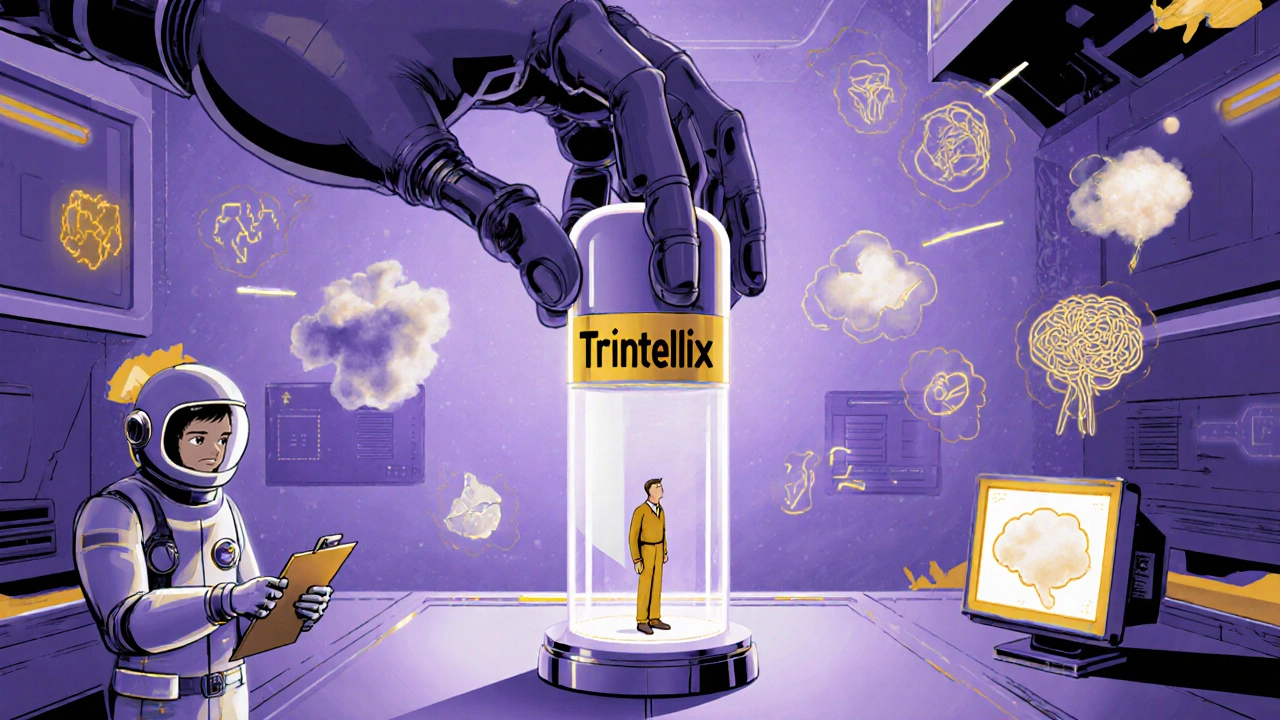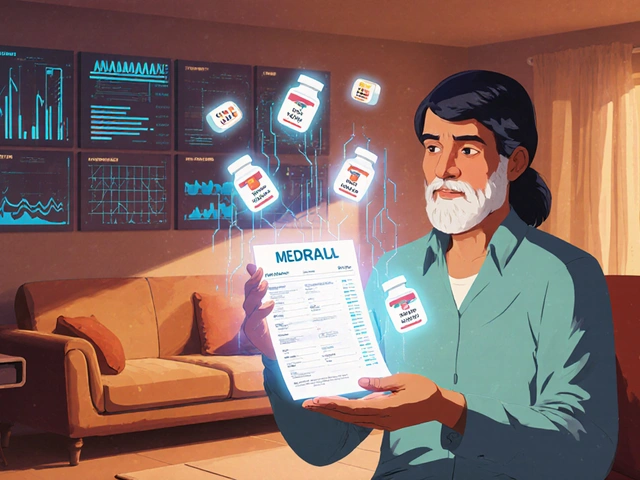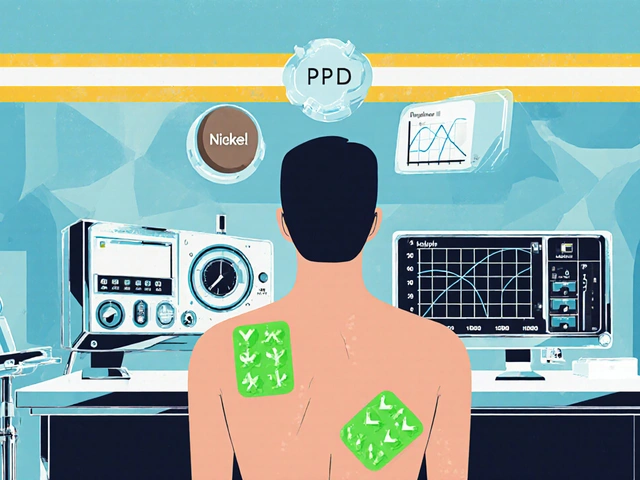
If you're taking Effexor XR (venlafaxine) and wondering if there's a better fit, you're not alone. Many people start on this medication for depression or anxiety, only to find side effects like nausea, dizziness, or emotional numbness that make it hard to stick with. Others notice their symptoms improving but still feel something’s off - like the medication isn’t quite right for their body or lifestyle. The good news? You don’t have to stay on Effexor XR if it’s not working. There are several alternatives, each with different benefits, side effects, and how they work in your brain.
How Effexor XR Works
Effexor XR is an SNRI - serotonin and norepinephrine reuptake inhibitor. That means it boosts two key brain chemicals: serotonin, which helps regulate mood, and norepinephrine, which affects energy and focus. Unlike older antidepressants like SSRIs (which only target serotonin), Effexor XR hits both. This can make it more effective for people with severe depression, chronic pain, or anxiety disorders that don’t respond to SSRIs alone.
It’s extended-release, so you take it once a day, usually in the morning. Many people notice improvements in mood and energy within 2 to 4 weeks, but full effects can take up to 8 weeks. The average starting dose is 75 mg per day, with some people needing up to 225 mg. But higher doses often mean more side effects.
Common side effects include dry mouth, sweating, insomnia, constipation, and sexual dysfunction. Some people report feeling emotionally flat or disconnected - a side effect that’s often underdiscussed but deeply impacts quality of life.
Alternatives to Effexor XR
There’s no one-size-fits-all antidepressant. What works for one person might not work for another. Here are the most common alternatives, grouped by type.
1. Other SNRIs: Cymbalta (Duloxetine) and Pristiq (Desvenlafaxine)
Since Effexor XR is an SNRI, it makes sense to compare it with others in the same class.
- Cymbalta (duloxetine): Similar to Effexor XR in how it works, but it’s also FDA-approved for diabetic nerve pain and fibromyalgia. People who struggle with physical symptoms like muscle aches or chronic pain often switch to Cymbalta. Side effects are almost identical - nausea, dizziness, fatigue - but some report less emotional blunting.
- Pristiq (desvenlafaxine): This is actually the active metabolite of venlafaxine. It’s marketed as having fewer side effects and simpler dosing (50 mg daily). But studies show it’s not significantly more effective than Effexor XR. It’s also more expensive and doesn’t have as much real-world data behind it.
If you’re already on Effexor XR and doing okay but want to reduce side effects, switching to Pristiq might help. But don’t expect a miracle. Many people find little difference.
2. SSRIs: Lexapro (Escitalopram), Zoloft (Sertraline), Prozac (Fluoxetine)
SSRIs only affect serotonin, so they’re less powerful than SNRIs - but they’re also gentler. For many people, they’re the first-line treatment for mild to moderate depression and anxiety.
- Lexapro (escitalopram): Often considered the most tolerable SSRI. It’s effective for generalized anxiety disorder (GAD) and depression. Side effects are milder than Effexor XR - less sweating, less blood pressure impact. Many people switch from Effexor XR to Lexapro to reduce sexual side effects or dizziness.
- Zoloft (sertraline): One of the most prescribed antidepressants in the world. It’s affordable, well-studied, and works for OCD, panic disorder, and social anxiety too. It can cause initial nausea or diarrhea, but those usually fade. Unlike Effexor XR, it doesn’t raise blood pressure.
- Prozac (fluoxetine): Has a long half-life, meaning it stays in your system for weeks. This can be helpful if you miss a dose, but it also makes withdrawal harder if you ever stop. Some people prefer Prozac for its energizing effect - it’s less sedating than Effexor XR.
If your main issue is anxiety without physical pain or low energy, an SSRI might be enough. And if you’re concerned about withdrawal symptoms when stopping, SSRIs like Zoloft and Lexapro tend to be easier to taper off than Effexor XR.
3. Atypical Antidepressants: Wellbutrin (Bupropion)
Wellbutrin is completely different. It doesn’t touch serotonin at all. Instead, it boosts dopamine and norepinephrine. That makes it unique - and useful for people who feel sluggish, unmotivated, or have trouble concentrating.
Many people switch from Effexor XR to Wellbutrin because they want to:
- Regain libido (it’s one of the few antidepressants that doesn’t cause sexual side effects)
- Reduce weight gain (Effexor XR can cause weight gain; Wellbutrin often causes slight weight loss)
- Feel more alert and focused
But it’s not for everyone. Wellbutrin can increase anxiety or trigger insomnia in some. It also carries a small risk of seizures, especially at high doses or if you have a history of seizures or eating disorders.
If you’re tired of feeling emotionally dull or sexually numb on Effexor XR, Wellbutrin might be your best bet. But if you struggle with panic attacks or severe anxiety, it might make things worse.
4. MAOIs: Parnate (Tranylcypromine), Nardil (Phenelzine)
MAOIs are older antidepressants, rarely used today because they require strict diet restrictions (no aged cheese, wine, or cured meats) and can interact dangerously with other medications. But for treatment-resistant depression - when everything else has failed - they can be life-changing.
Studies show MAOIs work better than SSRIs and SNRIs for people with atypical depression (characterized by oversleeping, overeating, and sensitivity to rejection). If you’ve tried multiple meds and still feel stuck, your doctor might consider an MAOI.
They’re not a first choice. But they’re a powerful option when others fall short.
5. Newer Options: Viibryd (Vilazodone) and Trintellix (Vortioxetine)
These are newer, less commonly prescribed antidepressants that work differently.
- Viibryd: Combines SSRI action with partial serotonin receptor activation. It’s less likely to cause weight gain or sexual side effects than Effexor XR. But it often causes diarrhea at first.
- Trintellix: Works on multiple serotonin receptors. It’s been shown to improve not just mood but also cognitive symptoms like trouble concentrating or memory issues. It’s often recommended for people who feel mentally foggy on other meds.
Both are pricier than older generics. But if you’re struggling with brain fog or want to avoid sexual side effects, they’re worth discussing.
What to Consider When Switching
Switching antidepressants isn’t like changing your shampoo. Your brain adapts to the chemistry of the drug you’re on. Stopping Effexor XR abruptly can cause withdrawal symptoms - dizziness, electric-shock sensations, irritability, nausea - even if you’ve only been on it for a few weeks.
Here’s how to do it safely:
- Never stop cold turkey. Work with your doctor to taper slowly - usually over 2 to 4 weeks.
- Start the new medication at a low dose while tapering off Effexor XR. This reduces the risk of serotonin syndrome.
- Give the new drug at least 6 to 8 weeks to work. Don’t assume it’s not working after 2 weeks.
- Track your symptoms. Keep a simple journal: mood, sleep, energy, side effects. This helps your doctor adjust faster.
Some people switch and feel better immediately. Others feel worse for a few weeks. That’s normal. The key is patience and communication with your provider.
Who Should Avoid Effexor XR and Its Alternatives
Not everyone can take these medications. Avoid Effexor XR and other SNRIs if you:
- Have uncontrolled high blood pressure (they can raise it)
- Have liver or kidney disease (your body can’t process them properly)
- Are pregnant or breastfeeding (data is limited; risks must be weighed)
- Have a history of bipolar disorder (antidepressants can trigger mania)
- Take MAOIs or have taken them in the last 14 days (dangerous interaction)
Wellbutrin is risky if you have seizures, an eating disorder, or are withdrawing from alcohol or benzodiazepines.
Always tell your doctor about all medications, supplements, and herbs you’re taking. Even something as simple as St. John’s Wort can interact dangerously.
Real-World Experience: What People Actually Say
Online forums and patient reviews show patterns:
- “I switched from Effexor XR to Lexapro and finally slept through the night.” - Sarah, 34, Perth
- “Effexor made me feel like a zombie. Wellbutrin gave me my energy back.” - Mark, 42, Melbourne
- “I tried everything. Then my doctor put me on Pristiq - same effect, less nausea.” - Lena, 29, Sydney
- “I went from Effexor XR to Trintellix and could finally focus at work again.” - James, 51, Brisbane
These aren’t clinical trials. But they reflect real experiences - and they show that people find relief in different places.

Cost and Accessibility
In Australia, Effexor XR is covered under the PBS (Pharmaceutical Benefits Scheme). The co-payment is around $30 for concession card holders, $160 for others. Generic venlafaxine is cheaper.
Lexapro and Zoloft are also PBS-listed and widely available as generics. Wellbutrin is not PBS-covered in Australia, so it can cost $100+ per month out-of-pocket unless you’re on a concession.
Trintellix and Viibryd aren’t on the PBS at all. That makes them expensive - often $200+ per month. Insurance might cover them, but only if you’ve tried other options first.
If cost is a barrier, generics like sertraline or venlafaxine are your best bets.
Final Thoughts: What’s Right for You?
There’s no perfect antidepressant. The goal isn’t to find the “best” one - it’s to find the one that fits your body, your symptoms, and your life.
If you’re on Effexor XR and:
- Feel emotionally flat or sexually numb → Try Wellbutrin or an SSRI like Lexapro
- Have chronic pain → Consider Cymbalta
- Struggle with brain fog → Look at Trintellix
- Can’t afford the cost → Switch to generic venlafaxine or sertraline
- Have tried everything and still feel stuck → Talk to your doctor about MAOIs
Don’t suffer in silence because you think you’re stuck. Antidepressants aren’t forever. They’re tools. And if one doesn’t fit, there’s another that might.
Can I switch from Effexor XR to an SSRI safely?
Yes, but only under medical supervision. You’ll need to taper off Effexor XR slowly - usually over 2 to 4 weeks - before starting the SSRI. Stopping suddenly can cause withdrawal symptoms like dizziness, brain zaps, or nausea. Your doctor will likely start the SSRI at a low dose while reducing Effexor XR to avoid serotonin syndrome.
Is Effexor XR more effective than other antidepressants?
For moderate to severe depression, Effexor XR can be more effective than SSRIs like Zoloft or Lexapro, especially if you have physical symptoms like fatigue or pain. But for mild depression or anxiety, SSRIs often work just as well with fewer side effects. Effectiveness varies by person - what works for one may not work for another.
What’s the safest antidepressant to switch to?
Zoloft (sertraline) and Lexapro (escitalopram) are generally considered among the safest and most tolerable options. They have fewer drug interactions, lower risk of withdrawal symptoms, and are available as low-cost generics. They’re often the first choice when switching from Effexor XR, especially if you’re concerned about side effects.
Does Effexor XR cause weight gain?
Yes, some people gain weight on Effexor XR, especially with long-term use. Studies show an average weight gain of 1-2 kg over 6-12 months. If weight gain is a concern, Wellbutrin is a better option - it’s often linked to slight weight loss. Switching to an SSRI like Lexapro may also help, as it tends to have less impact on weight.
Can I take Effexor XR with alcohol?
It’s not recommended. Alcohol can increase drowsiness, dizziness, and impair your judgment when combined with Effexor XR. It can also worsen depression symptoms and increase the risk of liver damage. Even moderate drinking can interfere with how well the medication works. If you drink, talk to your doctor about safe limits - or consider cutting back entirely while on treatment.
Marcia Facundo
I took Effexor for 8 months and it turned me into a zombie who forgot how to laugh. Switched to Lexapro and suddenly I could feel grass under my feet again. No more emotional fog. Just peace.
Ajay Kumar
Look, everyone’s obsessed with SSRIs and SNRIs like they’re the only options, but have you even considered psychotherapy combined with lifestyle changes? I mean, serotonin isn’t some magic potion-it’s a biological response to behavior. You’re medicating symptoms while ignoring root causes like chronic stress, social isolation, poor sleep hygiene, and the fact that modern life is designed to make you anxious. Effexor might numb the pain, but it doesn’t fix the system that broke you in the first place. Also, MAOIs are actually underutilized because doctors are scared of dietary restrictions, not because they’re dangerous. I’ve seen people go from suicidal to functional on Parnate after failing 7 other meds. But no one wants to talk about that because it’s inconvenient.
Joseph Kiser
Hey, I get it-you’re scared. You’re tired of feeling nothing. You’re tired of your body betraying you. But here’s the truth: no pill fixes a soul that’s been neglected. Effexor? It’s a bandaid on a bullet wound. I’ve been where you are. I took everything-Wellbutrin, Zoloft, even Trintellix. The only thing that changed my life? Therapy, daily walks in nature, cutting out sugar, and finally saying ‘no’ to toxic people. You don’t need a new drug. You need a new life. And yes, I know it’s harder than popping a pill. But you’re worth the work. 💪❤️
Hazel Wolstenholme
One must acknowledge the epistemological limitations inherent in contemporary psychopharmacological discourse. The reductionist paradigm that equates mood dysregulation with neurotransmitter deficiency is not only scientifically untenable but ethically perilous. One is reminded of the early 20th-century humoral theory-equally simplistic, equally damaging. The proliferation of SSRIs and SNRIs as first-line interventions reflects not therapeutic efficacy, but pharmaceutical hegemony. One must interrogate the DSM’s ontological violence and the commodification of suffering. Trintellix, for instance, is marketed as a cognitive enhancer, yet its mechanism remains poorly understood outside the proprietary confines of Lundbeck’s white papers. One wonders: are we treating depression-or manufacturing compliance?
Mike Laska
Okay so I switched from Effexor to Wellbutrin and holy hell it was like someone turned the volume back up on my life. I cried during a commercial for dog food. I remembered what coffee tasted like. I started painting again. I didn’t know I’d forgotten how to feel until I felt it. And then I got anxious because I didn’t know what to do with all this emotion. But I’d rather be messy and alive than numb and ‘stable.’
Alexa Apeli
Thank you for sharing such a comprehensive and thoughtful overview. 🌟 Your clarity and attention to detail are truly commendable. For anyone navigating this journey, please remember that you are not alone, and progress-no matter how small-is still progress. Wishing you all strength, patience, and healing. 💙
Eileen Choudhury
Guys, I know it’s scary to switch meds-but please don’t give up. I was on Effexor for 3 years, felt like a ghost, then tried Zoloft and almost died from withdrawal. But I didn’t quit. I worked with my doc, slowed down, and now I’m on Lexapro. I sleep. I laugh. I call my mom without crying. It took 11 months and 4 tries. But I’m here. You can be too. One step. One day. One breath. You got this. 🌈
Zachary Sargent
Effexor made me gain 30 pounds and lose my sex drive. I switched to Wellbutrin. Lost 15 pounds. Got my libido back. Now I’m dating again. Who knew a pill could be a love potion? Also, I still take it with a beer. Don’t tell my doctor.
Melissa Kummer
It is imperative to underscore the critical importance of individualized treatment protocols in psychiatric pharmacotherapy. The assertion that one medication is universally superior to another lacks empirical grounding and risks fostering therapeutic nihilism. Evidence-based practice mandates a biopsychosocial approach, wherein pharmacological intervention is but one component of a multidimensional care plan. Furthermore, adherence to tapering schedules is not merely advisable-it is a clinical imperative to mitigate discontinuation syndrome. I commend the author for presenting a balanced, nuanced perspective that respects patient autonomy and clinical complexity. 🙏
andrea navio quiros
effexor made me feel like my brain was wrapped in plastic wrap and someone was poking it with a stick
wellbutrin gave me back my focus but now i cant sleep
lexapro made me feel calm but i forgot why i was mad in the first place
the real problem is we treat feelings like bugs to kill not signals to listen to
we need better systems not better pills
and yes i know this is a rant but its the truth
Pradeep Kumar
From India here-so many people think antidepressants are only for ‘Western’ people. But depression doesn’t care about your passport. My cousin took Zoloft after trying everything. She said it didn’t fix her life, but it gave her the energy to fix it herself. I wish more people knew that. Also, in India, generics are a lifesaver. We don’t need fancy brands. We need access. 🙏
Andy Ruff
Let me be clear: if you’re switching meds because you’re too lazy to go to therapy or too weak to face your trauma, you’re not healing-you’re cheating. Effexor didn’t make you numb, your life did. Pills are not a substitute for accountability. You want to feel better? Stop scrolling. Start moving. Talk to someone real. Get sunlight. Stop drinking. Stop numbing. The medication is just a crutch. The real work is yours. And if you’re not ready for that? Then don’t blame the drug. Blame yourself.





Write a comment